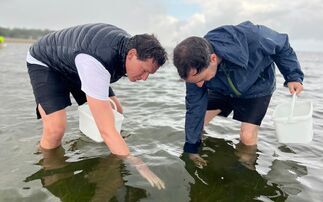Farm-Hand and LettUs Grow named as latest winners in Shell's high profile clean tech funding competition
Two of the UK's leading sustainable agriculture start-ups are celebrating after securing funding from Shell Enterprise Development, supporting two very different approaches to tackling the environmental challenges faced by the global farming sector.
The energy giant's entrepreneur development programme used the Shell Energy Summit in Weybridge yesterday to announce the winners of its annual Shell Springboard and Shell LiveWIRE Young Entrepreneurs.
East-Lothian-based Farm-Hand was named as winner of the Springboard competition, and is to receive £110,000 in equity-free funding from Shell in addition to the £40,000 of funding provided to all of the companies which made the final shortlist. Meanwhile, Charlie Guy, managing director of Bristol-based LettUs Grow is to receive £30,000 after winning the annual LiveWIRE entrepreneur competition.
Both companies said they would use the cash injections to scale up their operations following successful technology trials.
LettUs Grow has developed aeroponic vertical farm technology that can grow crops without using soil, slashing water use by 95 per cent in the process.
Speaking to BusinessGreen, Guy said the company had successfully cultivated 50 crops using the technology, including herbs, leafy greens, strawberries, and carrots. It is also working on using the approach to grow much larger crops that could then be transferred to fields once they have "got a great start in life".
He added that vertical farming and LettUs Grow's patented technology has huge potential as the company seeks to pursue its ambitious expansion plans following three successful pilot sites. "This approach reduces agricultural inputs, reduces reliance on inputs, and can work in urban and rural settings, so it reduces the need to move food around," he said. "Last year at the peak of the heat wave the UK was air-freighting in 10,000 heads of lettuce a week from the US and that is simply unsustainable."
Guy also argued that vertical farming approaches have a critical role to play in enhancing climate resilience across the agricultural sector. "It is part of the answer to the question, how do you produce food in a less climatically stable environment," he said, citing the example of France where crops have been destroyed this summer by fierce hailstorms that have been followed by a 40C+ heatwave.
Climate resilience is similarly at the heart of Farm-Hand's proposition, which provides a combination of software and hardware to smallhold farmers in India that allows them to track hyper-localised weather forecasts in order to optimise irrigation.
Trials of the technology have shown how personalised irrigation schedules can boost crop yields by 30 per cent while reducing water and energy inputs by 70 per cent.
Speaking to BusinessGreen, CEO Abhimanyu Bhargava said the new funding would help the organisation scale up as it works on plans to solidify partnerships with up to 14 organisations that together have access to around 7.4 million farms.
Announcing the results of the Springboard competition, chair of the judging panel Baroness Brown of Cambridge said it had been a unanimous decision to declare Farm-Hand the winner.
"The judges were impressed by the work the company had undertaken in using free resources in the form of local weather forecasts, combined with boots-on-the-ground intelligence to enable the business to develop effective, bespoke products for farmers working in challenging conditions," she said. "Farm-Hand's business model addresses a number of issues; not only does its proprietary technology dramatically reduce water waste in areas where water is scarce, but it also cuts down on electricity use and offers real, tangible social benefit for families relying on the agricultural sector as their main source of income."
Brown praised the quality and breadth of all the entries for this year's awards, while also calling for the sector as a whole to redouble efforts to help more women-led businesses scale up.
The full line up of finalists included start-ups from right across the clean tech community, such as automated tree-planting specialist BioCarbon Engineering, biomimicry building materials Biohm, silicon solar cell technology firm Cambridge Photon Technology, wind turbine aerodynamic optimisation player Anakata.
The BusinessGreen Powering Progress Together Hub is supported by Shell. All the hub's content is editorially independent, unless stated otherwise.









